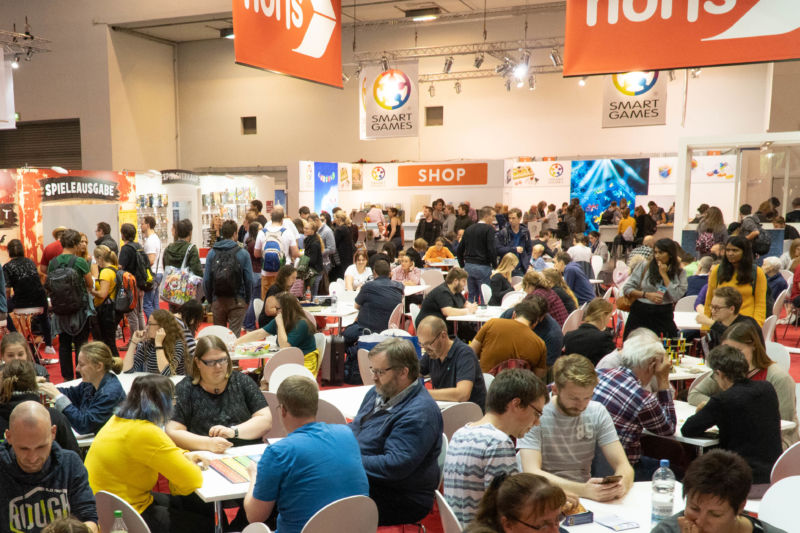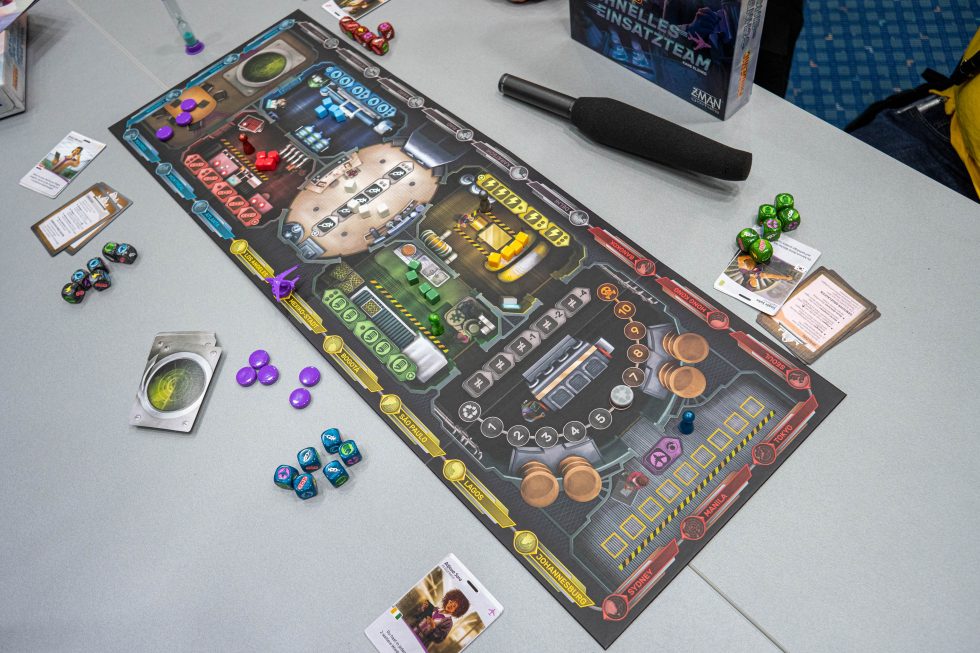
For four days each year, the German city of Essen becomes the center of the tabletop gaming universe. The annual Internationale Spieltage fair—better known simply as "Spiel"—sees publishers from around the world unleash their most anticipated new releases.
This year, more than 1,200 exhibitors from 53 countries showed off their games across 86,000 square meters of floor space. With so much to see, it’s impossible to take in more than a tiny fraction of the games on offer. But for the past few years, I’ve been wandering the halls on behalf of Ars readers, hunting for clever, cool, innovative, and entertaining new tabletop titles. So once again I took a deep breath and dove head first into a maelstrom of cards, dice, meeples, and miniatures. And here are my picks from the games I managed to play.
Obscurio
A growing subcategory of board games challenges players to convey information using cryptic collections of images—think Dixit, Mysterium, or Deception: Murder in Hong Kong.
Obscurio is the latest addition to the bunch. It casts you and your partners as wizards trapped in a maze-like magical library. To escape, you need to open a succession of doors and find your way to freedom. Each door shows a different arcane image, and one player acts as a guide, using picture cards and subtle similarities between different illustrations to point everyone else in the right direction.
It might sound familiar to anyone who has played similar games, but Obscurio makes some tweaks to the well-established blueprint. For one thing, the guide can use a pair of magnetic arrows to highlight particular elements on the image cards, drawing players’ attention to different colors, shapes, and objects. There’s also a limit on how long players can deliberate over their decisions, and taking too long to choose a door incurs penalties which make things tougher in subsequent rounds.
One player also acts as a secret traitor, actively trying to frustrate the group’s effort to escape. In a game with such a pronounced element of ambiguity, there are plenty of opportunities to subtly derail your friends’ progress, and it’s all bound together with a Hogwarts-style aesthetic.
Pandemic: Rapid Response

With the lineup of Pandemic games growing at a rate that would make a virulent strain of e. coli jealous, it’s tempting to wonder how far the franchise can expand without running out of creative juice. Rapid Response suggests it has a ways to go yet.
Players control a team of specialists, each with different abilities, rushing to locations around the world to combat epidemics and prevent the fall of civilization. Rather than a map, though, the board now represents a plane, with different sections devoted to producing different types of medicines and resources needed to fight various infectious strains.
You’ll do this by rolling and re-rolling dice, using the results to move around the aircraft and complete tasks while en route to the next global trouble spot. What makes this tricky is the remorseless time limit, forcing you to make quick decisions under pressure and inevitably creating more trouble in the process.
There’s a thematically jarring element where you can lose the game because your plane becomes too full of trash. But, like the original Pandemic, Rapid Response skillfully creates a mounting sense of tension. The game wasn’t the most fun I had with sand timers at Spiel, however…
House Flippers
This quick and quirky game sees players become rival property developers aiming to buy and sell a succession of homes, using the profits to retire to a life of luxury and leisure.
You start out with a single card—representing a dilapidated house—and a plastic sand timer. Whenever it runs out, you flip it over and receive a wooden cube representing rental income. Rent money and the proceeds from house sales combine to let you buy more expensive house cards, and along the way you can acquire additional timers and staff who increase your takings, allowing you to develop a prestigious property portfolio.
It’s reminiscent of Splendor and the Century series of spice-trading games, where players aim to string together a succession of judicious deals as efficiently as possible. But what makes House Flippers deliciously different is that you and your opponents all play simultaneously, snatching helpful cards before your rivals and constantly keeping one eye on your growing collection of timers.
At its core, the game is incredibly simple, but it creates a real frenzy at the table as you frantically claw your way towards the high life.
Marvel Champions: The Card Game
For years, tabletop studio Fantasy Flight Games has produced faithful adaptations of big-name pop-culture franchises. (See the Game of Thrones board and card games, Star Wars X-Wing miniature battle game, and the succession of releases based on J.R.R. Tolkien’s The Lord of the Rings novels.)
Fantasy Flight recently added Marvel Comics to its collection of geek-friendly licenses, and at Spiel the company was showing off a new cooperative card battler in which players become mighty heroes working together to take down an assortment of dastardly villains.
Mechanically, Champions feels like a slightly streamlined version of Final Fantasy's now-defunct Warhammer Quest Adventure Card Game. Players go head-to-head with an AI adversary. On each round, the antagonist works to fulfill their schemes, attacks the heroes, or dispatches minions to menace them. To save the day, players have to find clever ways to combine their strengths and overcome a constantly evolving set of dangers and obstacles.
Each player controls a single character, and it’s impressive how well their stats and abilities reflect their comic book representations. In our demo game, Spider-Man flipped and dodged to negate attacks, Black Panther deployed an array of advanced gadgets, and Captain Marvel used her powers of leadership to coordinate the heroes’ efforts.
Another nice touch is that heroes’ character cards are double-sided, with one face representing their secret identity and the other showing their spandex-clad alter ego. Each side comes with different powers, and working out which can be of most benefit at different points is an important step towards victory. The game’s pacing also does a great job of recreating an adrenaline-fueled comic book fight scene. Even though I’m not a fan of superheroes, I’d be more than happy to play Champions again.
